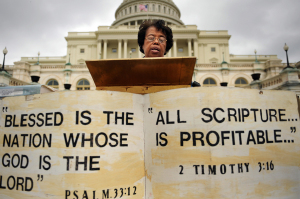The reality of sin in the Church

There’s an interesting trend happening in the Evangelical Church. In the efforts of making the Church “the best it can be,” evangelicals are only comfortable confronting certain minor sins within the Church body and struggle to admit Christians could ever do something truly awful.
We are allowed to conceive of Christians doing some questionable things: Watching things we shouldn’t, drinking things we shouldn’t, or voting for things we shouldn’t. But we can’t conceive of people in the Church committing “really big sins.” We struggle, for example, to consider whether our church might be complicit in the kinds of heinous sexual abuse discovered in some denominations.
This “problem of inconceivable sin” glitches our self-perception: if those things do happen, they don’t happen here — or if they happen here, they can’t happen very often. If they did, the shame would be indescribable. That fear of shame blinds us so that we are unable to confront whether truly horrific things are happening in secret in our own church.
And to be clear, I agree that the Evangelical Church is a force for good. But that does not mean sexual abuse is rare. Cultural issues are drawn into the Church like water through a sponge. Consider the culture of recent decades. We had a president who used his position and privilege to have inappropriate relationships with much younger women. At the time, this was largely treated as “business as usual.” Another political figure was able to use his position and power for decades to traffic underage girls to politicians and power brokers. The Weinstein Company, Amazon, Google, Activision, and Riot games (just to name a few) have litigated or settled legal actions for workplace sexual harassment and discrimination.
The surrounding culture is rife with sexual sin, and sexual sin is contagious. The data bears out this pathology. According to a study by Church Law and Tax, one in every six employees or volunteers reported being sexually harassed in the Church or ministry context. Seventy percent of respondents said they were harassed by more than one person, and of those who reported their harassment, 66% reported that no action was taken (regardless of whether they were believed). A 2014 study found that one in nine girls and one in 53 boys would experience sexual abuse or assault as a child, with other studies even suggesting those numbers are conservative. Around 90% of offenders are known to their victims, and around 33% of offenders are family members. Considering the prevalence of abuse in society, the prognosis is grim. Sexual abuse (both of children and adults) is common. And when Christians fail to confront sin, it damages the Church.
In Church Law and Tax’s 2020 survey, 35% of respondents indicated that sexual harassment affected their faith. Their numbers line up well with Pew Research polls, which continue to show an exodus of millennials (and younger generations) from the Church.
Behind many of those who have lost their faith is a story of betrayal and abuse by someone in a position of power. It could be a family member or even a pastor. And for those who have not been victims of abuse or harassment, many know someone or know of someone who has been a victim.
Three factors must be present for abuse to happen:
1. A would-be offender;
2. A potential victim; and
3. A lack of a capable guardian.
Churches, by disposition, are full of potential targets. By vocation, we serve the hungry, the thirsty, the strangers, and the widowed. Whatever we do unto the least of these, we do unto Jesus (Matthew 25:40). In our efforts to aid those less fortunate and gather so many potential victims, churches become an easy environment for would-be offenders to connect with potential victims.
That alone (potential victim and would-be offender) does not add up to abuse, provided a capable guardian confronts them and corrects the situation. However, this is what leads to shame and denial. You cannot watch for something that you do not believe exists, and you cannot confront something if you don’t know how. By denying the prevalence of sexual abuse and harassment in the Church, we sabotage our ability to prepare for, identify, and confront would-be offenders.
Even if it were true that abuse is not a problem, victims cannot be litigated back to Christ by telling them their experience is “just one incident, not a pattern.” Doing that is more like to crystalize their newfound faith that “the Church causes harm.”
Two things can be true. The Church can be a force for good, and the Church can have negligently harmed someone. Shame happens when we hear allegations not as a call for help but as an attack on our identity. Shame fuels denial, which in turn drives a wedge between us and those who have fled the faith. Worse, it creates opportunities for abusers to pass unnoticed among congregants.
Fortunately, it’s not entirely doom and gloom. As of 2020, 40% of churches had implemented written policies prohibiting sexual harassment. Conservative Americans seem to be taking a united front, calling out and confronting child abuse in the public school system and in homes. Organizations like the Evangelical Council for Abuse Prevention (ECAP) have instituted robust accrediting systems that help ensure churches and ministries are following best practices that keep children safe. Through the magic of the internet, Christian Anti-Harassment or Child Protection Training is more available (and cheaper) than it has ever been. Churches not only have tools to confront sexual abuse and harassment — they have the Holy Spirit’s power to rise up and meet this challenge of our times.
David Sidebotham is a founding member of Telios Teaches with over a decade of experience in curriculum management. He takes attorney generated curriculum and translates it into online courses that are accessible to all learners, while still remaining informative to learners who may be subject matter experts themselves. Telios Teaches includes both sexual harassment and child protection training.



























